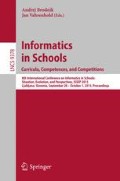Abstract
This paper introduces key characteristics of the situated learning approach and discusses from that perspective questions of pedagogy and educational research in Theory of Computation. This discussion exemplifies how a change in learning theories alters the unit of analysis, thus reframing research questions and potential answers. In its conclusion, this paper provides an outlook on potential research questions in secondary Computer Science Education.
Access this chapter
Tax calculation will be finalised at checkout
Purchases are for personal use only
Preview
Unable to display preview. Download preview PDF.
References
Anderson, J.R., Reder, L.M., Simon, H.A.: Situative versus cognitive perspectives: Form versus substance. Educational Researcher 26(1), 18–21 (1997)
Ben-Ari, M.: Situated learning in computer science education. Computer Science Education 14(2), 85–100 (2004)
Brown, J.S., Collins, A., Duguid, P.: Situated Cognition and the Culture of Learning. Educational Researcher 18(1), 32–42 (1989)
Chesñevar, C.I., González, M.P., Maguitman, A.G.: Didactic strategies for promoting significant learning in formal languages and automata theory. In: Proceedings of the 9th Annual SIGCSE Conference on Innovation and Technology in Computer Science Education (ITiCSE 2004), pp. 7–11. ACM (2004)
Collins, A., Brown, J.S., Holum, A.: Cognitive apprenticeship: Making thinking visible. American Educator 6(11), 38–46 (1991)
Daniels, M., Pears, A.: Models and methods for computing education research. In: Proc. Australasian Computing Education Conference (ACE). CRPIT, vol. 123, pp. 95–102 (2012)
Gramm, A., Hornung, M., Witten, H.: Email for you (only?): design and implementation of a context-based learning process on internetworking and cryptography. In: Proceedings of the 7th Workshop in Primary and Secondary Computing Education (WiPSCE), pp. 116–124. ACM, New York (2012)
Greeno, J.G.: On claims that answer the wrong questions. Educational Researcher 26(1), 5–17 (1997)
Hopcroft, J.E., Motwani, R., Ullman, J.D.: Introduction to Automata Theory, Languages, and Computation, 3rd edn. Pearson (2006)
Hundhausen, C.D.: Toward Effective Algorithm Visualization Artifacts: Designing for Participation and Communication in an Undergraduate Algorithms Course. Doctoral Thesis, University of Oregon, US (1999)
Kaptelinin, V., Nardi, B.: Acting with Technology –Activity Theory and Interaction Design. MIT Press, Cambridge (2004)
Knobelsdorf, M., Magenheim, J., Brinda, T., Engbring, D., Humbert, L., Pasternak, A., Schroeder, U., Thomas, M., Vahrenhold, J.: Computer Science Education in North-Rhine Westphalia, Germany – A Case Study. ACM Transactions on Computing Education 15(2) (2015)
Knobelsdorf, M., Tenenberg, J.: The context-based approach iniK in light of situated and constructive learning theories. In: Diethelm, I., Mittermeir, R.T. (eds.) ISSEP 2013. LNCS, vol. 7780, pp. 103–114. Springer, Heidelberg (2013)
Knobelsdorf, M., Isohanni, E., Tenenberg, J.: The reasons might be different – why students and teachers do not use visualization tools. In: Proceedings of the 12th Annual Finnish/Baltic Sea Conference on Computer Science Education (Koli), pp. 1–10. ACM, New York (2012)
Knobelsdorf, M., Kreitz, C., Böhne, S.: Teaching theoretical computer science using a cognitive apprenticeship approach. In: Proceedings of the 45th ACM Technical Symposium on Computer Science Education (SIGCSE), pp. 67–72. ACM, New York (2014)
Kolikant, Y.B.-D., Ben-Ari, M.: Fertile Zones of Cultural Encounter in Computer Science Education. Journal of the Learning Sciences 17(1), 1–32 (2008)
Lave, J., Wenger, E.: Situated Learning: Legitimate Peripheral Participation. Cambridge University Press (1991)
Malmi, L., Sheard, J., Simon, B.R., Helminen, J., Kinnunen, P., Korhonen, A., Myller, N., Sorva, J., Taherkhani, A.: Theoretical underpinnings of computing education research: what is the evidence? In: Proceedings of the International Workshop of Computing Education Research (ICER), pp. 27–34. ACM, New York (2014)
Nentwig, P.M., Demuth, R., Parchmann, I., Gräsel, I., Ralle, B.: Chemie im Kontext: Situated Learning in Relevant Contexts while Systematically Developing Basic Chemical Concepts. Journal of Chemical Education 84(9), 1439–1444 (2007)
Nunes, T.: What organizes our problem solving activities? In: Resnick, L., Saljo, R., Pontecorvo, C., Burge, B. (eds.) Discourse, Tools, and Reasoning: Essays in Situated Cognition, pp. 288–311. Springer (1997)
Pea, R.: Practices of distributed intelligence and designs for education. In: Salomon, G. (ed.) Distributed Cognition: Psychological and Educational Considerations, pp. 47–87. Cambridge University Press (1993)
Peters, A.-K., Rick, D.: Identity development in computing education: theoretical perspectives and an implementation in the classroom. In: Proceedings of the 9th Workshop in Primary and Secondary Computing Education (WiPSCE), pp. 70–79. ACM, New York (2014)
Rogoff, B.: The Cultural Nature of Human Development. Oxford University Press (2003)
Säljö, R.: Learning as the use of tools: a sociocultural perspective on the human-technology link. In: Littleton, K., Light, P. (eds.) Learning with Computers, pp. 144–161. Routledge, New York (1998)
Sfard, A.: On Two Metaphors for Learning and the Dangers of Choosing Just One. Educational Researcher 27(2), 4–13 (1998)
Tenenberg, J., Knobelsdorf, M.: Out of Our Minds: A Review of Sociocultural Cognition Theory. Computer Science Education 24(1), 1–24 (2014)
Vygotsky, L.S.: Mind in Society: The Development of Higher Psychological Processes. Harvard University Press (1978)
Vygotsky, L.S.: The instrumental method in psychology. In: Wertsch, J.V., Sharpe, M.E. (eds.) The Concept of Activity in Soviet Psychology (1981)
Author information
Authors and Affiliations
Corresponding author
Editor information
Editors and Affiliations
Rights and permissions
Copyright information
© 2015 Springer International Publishing Switzerland
About this paper
Cite this paper
Knobelsdorf, M. (2015). The Theory Behind Theory - Computer Science Education Research Through the Lenses of Situated Learning. In: Brodnik, A., Vahrenhold, J. (eds) Informatics in Schools. Curricula, Competences, and Competitions. ISSEP 2015. Lecture Notes in Computer Science(), vol 9378. Springer, Cham. https://doi.org/10.1007/978-3-319-25396-1_2
Download citation
DOI: https://doi.org/10.1007/978-3-319-25396-1_2
Published:
Publisher Name: Springer, Cham
Print ISBN: 978-3-319-25395-4
Online ISBN: 978-3-319-25396-1
eBook Packages: Computer ScienceComputer Science (R0)

